
Vanilla extract isn’t just a popular ingredient. It’s now become a staple for most types of baking, including cakes, cookies, and so much more. Vanilla extract is used so often that many bakers make sure they always have some of it on hand.
Notably, vanilla extract isn’t just used in vanilla flavored products. It’s often seen as a base flavor, so you’ll find it in plenty of other recipes, including chocolate chip cookies, chocolate cake, and more. The vanilla isn’t wasted here, as it helps to balance out the other flavors, creating a tastier and more well-rounded dessert.
Yet, vanilla extract is also expensive. You’re often paying $1 to $3 per ounce, sometimes more, which is frustrating when finances are tight. The extract is often made with alcohol too, which is another reason that some people avoid it. Finally, you might be reaching for vanilla and find you’ve run out.
In any of these situations, you might choose to use substitutes for vanilla extract instead. Some of these vanilla extract substitutes keep the vanilla flavor, like vanilla paste or imitation vanilla, while others have a completely different flavor profile, like orange zest or ground coffee. Yet, similar flavor or not, these ingredients can all be used instead of your vanilla.
You’ll see a broader range of substitutions in this list than normal. That’s because, unlike eggs or baking soda, vanilla extract is only relevant to the flavor of your recipe, not its function. Changing to a completely different ingredient typically just makes your dish taste different, rather than ruining it entirely.
Substitutes For Vanilla Extract
Vanilla Beans

The closest substitution for vanilla extract is to use vanilla beans themselves. Here you’ll need to slice the bean in half and then scrape out the seeds from the interior and use these in place of vanilla extract. For every tablespoon of vanilla extract in your recipe, you’ll want the seeds of a single vanilla pod.
You could also use vanilla beans to make your own vanilla extract. This is as simple as allowing the vanilla to infuse in alcohol, often vodka. However, this infusion isn’t fast. You’ll need to wait at least eight weeks before using the extract. It will taste even better if you wait for six months.
Beyond this, you can turn to one of many products made from pure vanilla. Vanilla bean paste is a popular option, which you can use as a 1:1 replacement.
There’s also vanilla bean powder. This has been made using dried and ground vanilla beans, so it provides the same flavor as vanilla extract without using any alcohol. Here, you’ll use half a tablespoon to a full tablespoon for every tablespoon of vanilla extract in your recipe.
Vanilla salt and vanilla sugar are options as well. Because these have a milder flavor, it’s often best to sprinkle them on top of your finished dishes, rather than mixing them in with the other ingredients.
Imitation Vanilla

Then we have imitation vanilla, which may also be called vanilla flavoring or vanilla essence. This tends to be less flavorful than vanilla extract, so you’ll often need twice as much imitation vanilla in your recipe.
Still… imitation vanilla is much cheaper than vanilla extract, so it’s a viable option.
As the name suggests, imitation vanilla is made artificially. The compound responsible for vanilla, vanillin, is extracted from other sources. Wood byproducts are a common source of this vanillin compound, although there are plenty of other options too.
When made well, imitation vanilla can taste much like the real deal. That’s not so surprising, as the base flavoring compound is identical. However, artificial vanilla products just focus on vanillin and they miss the other aromatic compounds found in vanilla. As a result, imitation vanilla lacks the complexity found in true vanilla.
Using imitation products instead of authentic vanilla works best in cooked dishes or where vanilla is a complementary flavor. In such recipes, the nuances of authentic vanilla will be largely unnoticeable anyway, especially as heat can damage some aromatic compounds. So, you might as well use the cheaper versions.
For dishes that focus on the vanilla flavor, like vanilla cake, authentic vanilla is the way to go. This is especially true for uncooked recipes, like ice cream.
Maple Syrup
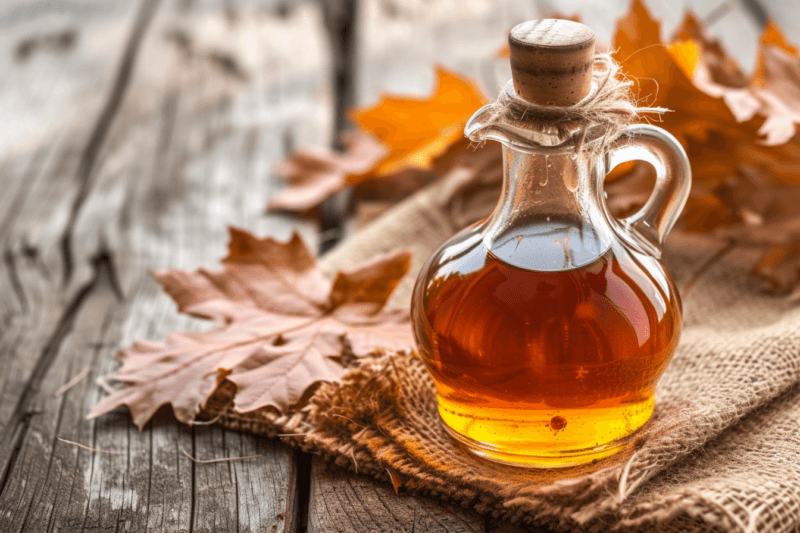
Instead of trying to mimic the taste of vanilla extract, you can look for a different flavor profile. The trick is to find something that matches the other flavors in your recipe.
Maple syrup is a great starting point, as it works well in many of the same recipes as vanilla extract – particularly in baking. You can even use maple syrup as a one-to-one replacement.
In terms of flavor, vanilla extract provides vanilla notes and some sweet notes, while maple syrup provides a more caramelized flavor and extra sweetness. As such, this substitution is best in sweet recipes, ones that work with a caramel flavor.
Spices

Spices are an excellent way to impart flavor, so why not use one in the place of vanilla extract? Here, you’ll normally be looking for a warming spice, like nutmeg, cinnamon, or cardamom. Ginger is worth experimenting with too, as it can be exceptional in some recipes.
It’s best to start with half a teaspoon of your spice for every teaspoon of vanilla extract in your recipe. This is especially true for strong spices like ginger.
If you’re concerned about the flavor profile, start with just a pinch of the spice. You can always add more until the taste is exactly right.
There are also cases where you might use an herb instead. For example, dried lavender adds surprisingly delicious floral notes to baking.
Spice Mixes

You can also experiment with spice mixes, such as chai spice and pumpkin pie spice. These contain multiple well-balanced ingredients, which gives them a complex flavor profile.
Some such mixes could even be used in recipes where vanilla is the dominant flavor. For example, you could make pumpkin pie spice cookies instead of vanilla cookies.
The spice mixes work just as well when vanilla is a background flavor. Here, they add complexity, making your recipe much more interesting.
Coffee

What about using coffee in your recipe? This adds a completely different flavor, one that’s also very appealing.
Coffee works best in cases where vanilla is a subtle background flavor. In such recipes, using coffee should add extra depth without overwhelming the recipe. Try using coffee in chocolate-based desserts. In many ways, coffee is even better than vanilla here.
You have a variety of options for using coffee. One is to simply add a teaspoon of instant coffee into your recipe. You could also try using strong espresso or perhaps coffee liqueur.
Vanilla-Flavored Milk

If you specifically want vanilla in your recipe, then vanilla milk is a good choice. We’re mostly talking about plant-based milk here, like soy milk or almond milk. However, you can sometimes find vanilla dairy milk as well.
Vanilla milk generally has a milder flavor than vanilla extract, so it won’t work as a 1:1 replacement. The best approach is to use vanilla milk instead of any milk your recipe calls for. If your recipe doesn’t use milk, this mightn’t be the best substitute.
Flavored Extracts

Vanilla extract is just one of many flavored extracts. So, why not use a different type instead?
Almond extract is the most popular alternative here, partly because it is already featured in many baking recipes. The nutty flavor of almonds also works well in most recipes that call for vanilla.
Lemon extract is an easy choice too. That’s not surprising given that lemon juice is used in plenty of recipes. More care is needed with this one, as lemon has bitter notes. These work well in some recipes and poorly in others.
Beyond this, there are dozens of flavored extracts to experiment with, including peppermint extract, coconut extract, orange extract, and raspberry extract. They can all be used as a one-to-one replacement for vanilla extract. While none replicate the flavor of vanilla, they all work well with the right recipe.
Fruit Zest

Fruit zest is another interesting way to add a flavor kick to your baking. Orange zest is the most popular here, especially in recipes that already have orange flavor tones.
You can also experiment with other citrus zests, including grapefruit, lime, or lemon zest. Many have some bitterness to them and you’ll need to carefully match the flavor with your recipe.
Zesting fresh fruit is easy and you don’t need much zest to add a punch of flavor. Just be sure to avoid the white fruit pith as you do so. This is extremely bitter and can mess with the flavor of your baking.
Using zest means there’s a little less liquid in your recipe than normal. This won’t matter much in some recipes. But, in others, you may need to adjust the amount of liquid to compensate.
Dark Liquor

A dark spirit, like brandy or bourbon, is a surprisingly good replacement for vanilla extract. This is partly because vanilla extract contains alcohol anyway.
Plus, the dark spirits all add a fantastic depth of flavor to baking, making your treat taste fantastic. Most of the alcohol should cook out anyway if your dish spends any time on the oven or stovetop.
You could look for vanilla vodka, like the one from Absolut Vodka. This way, you’re still getting some vanilla in your recipe. The vodka has other interesting flavors as well, including notes of dark chocolate.
A Flavored Liqueur

Liqueurs are another alcohol addition to consider. These tend to contain less alcohol than spirits and are also sweeter. This combo of features is excellent in many types of baking and desserts.
You can even find vanilla liqueurs. While these won’t taste exactly like vanilla extract, they will do the trick well.
Still, don’t be afraid to experiment. There are plenty of delicious liqueur flavors out there, including orange liqueur and caramel liqueur. You might even find that your substitution makes your dish better.
Which Vanilla Extract Substitutes Are Right For You?
Because vanilla extract is just responsible for flavor, the best substitutes will be influenced by your personal preferences. Which other flavors match your recipe? Which ones do you enjoy?
Practically, the best substitutes are often those you have on hand, such as a spice or a spice blend, orange zest, or perhaps some rum.
Cheapest Alternatives To Vanilla Extract
Vanilla milk, some spices, orange zest, and coffee are some of the cheapest alternatives to vanilla extract. It helps that you may already have some of these on hand, so you don’t need to go out and buy anything.
Best Vanilla Extract Substitutes For Vanilla-Based Recipes
Substitutes like orange zest, almond extract, and whiskey are fantastic when your recipe uses vanilla as one of many flavors, but they don’t work well for vanilla-based recipes. For these, you’ll need an ingredient like imitation vanilla, vanilla paste, or whole vanilla beans.
Alcohol-Free Vanilla Extract Substitutes
If you want authentic vanilla flavor without alcohol, then the seeds from vanilla beans and vanilla bean powder are the best choice. Vanilla paste can be alcohol free, but you’ll need to check carefully, as some brands do use alcohol.
Can You Skip Vanilla Extract Entirely?
Because vanilla extract is just there for flavor, you don’t need to replace it at all – you can simply leave it out. This approach works best when vanilla is a complementary flavor in your recipe, like if you’re making chocolate chip cookies. Don’t try to skip vanilla in vanilla ice cream or vanilla cake. That approach won’t work at all.

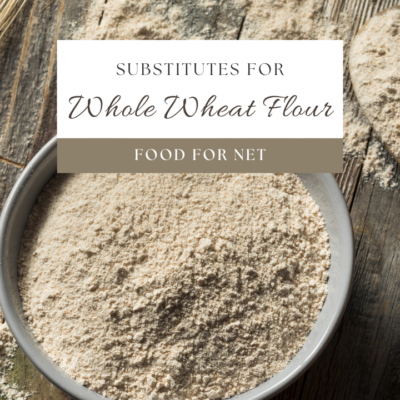
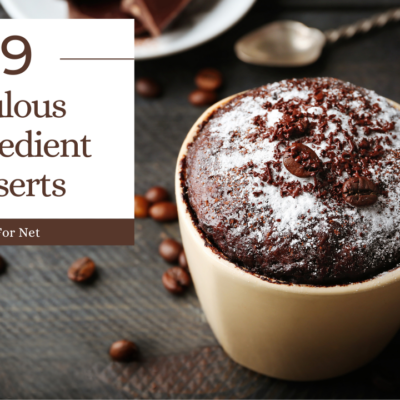
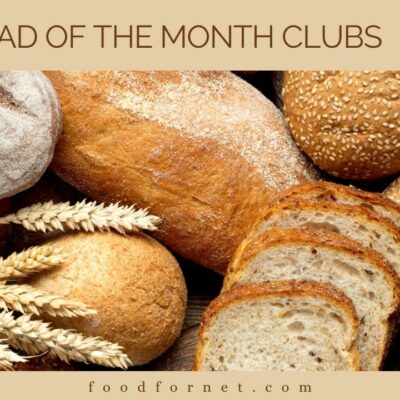
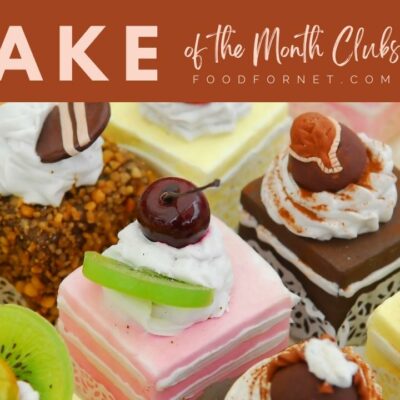

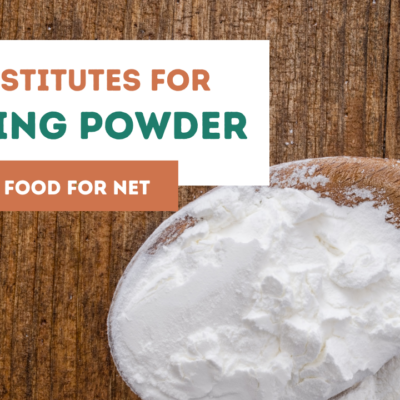


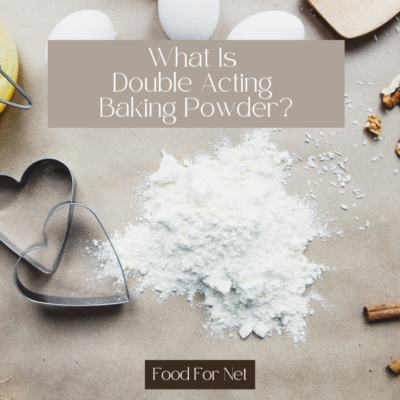



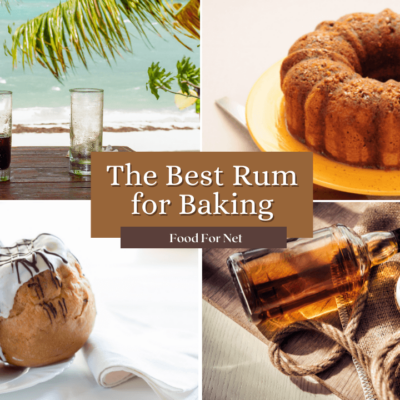



 How To Use Fresh Sage
How To Use Fresh Sage